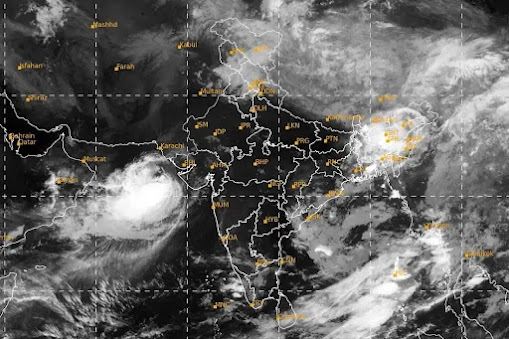Meeting on Rail Safety: Under the leadership of Ashwini Vaishnaw, a high-level meeting has been convened to address the challenges posed by Cyclone Biparjoy to railway operations in the affected regions. The objective is to devise a comprehensive strategy to safeguard the railway infrastructure, ensure passenger safety, and minimize disruptions in train services.
Safety Measures Implemented: During the meeting, various safety measures have been discussed and put into action to mitigate potential risks caused by the cyclone. These measures include:Regular monitoring of weather updates and timely communication with concerned railway officials.
Deployment of additional personnel for round-the-clock surveillance and emergency response.
Inspection of railway tracks, signaling systems, overhead equipment, and vulnerable structures to identify and rectify any potential weaknesses.
Provision of necessary resources such as sandbags, pumps, and generators to tackle flooding or power outages.
Coordination with local authorities, meteorological departments, and disaster management teams to ensure a swift and coordinated response in case of emergencies.
Post Checks at Gujarat and Maharashtra Stations: Following the cyclone's impact, thorough post-checks are being carried out at railway stations in Gujarat and Maharashtra to assess the extent of damage and determine the readiness for the resumption of train services. Key activities involved in the post-checks include:Inspection of platforms, tracks, and station buildings for any structural damage.
Evaluation of signaling systems and electrical installations to ensure their proper functioning.
Clearing debris, fallen trees, or other obstacles from the tracks to restore safe movement of trains.
Restoration of power supply and communication networks to facilitate smooth operations.
Cleaning and sanitization of station premises to ensure a safe and hygienic environment for passengers.
Communication and Passenger Information: Efficient communication channels have been established to keep passengers informed about the status of train services and any necessary changes. Real-time updates regarding train schedules, cancellations, and diversions are being shared through various mediums, including official railway websites, social media platforms, and information boards at stations. Passengers are advised to stay connected and check for updates before planning their journeys.
Emergency Response Teams: Specialized emergency response teams comprising railway personnel, safety officials, and medical staff have been mobilized in the affected areas. These teams are equipped with the necessary resources and training to promptly address any emergencies, provide first aid, and ensure the safety and well-being of passengers and railway staff.
Collaboration with Local Authorities: The Ministry of Railways is actively collaborating with local authorities, district administrations, and disaster management agencies to facilitate a coordinated response and streamline relief operations. This collaborative effort ensures a cohesive approach to addressing challenges and maximizing the effectiveness of rescue and relief efforts.
Restoration of Services: Efforts are underway to restore train services in the affected areas as soon as it is deemed safe. Once the post-checks are completed and the infrastructure is assessed to be in good condition, the resumption of train services will be planned meticulously, ensuring the safety of passengers and minimizing any further disruptions to travel.
Passenger Safety Guidelines: Passengers are urged to follow safety guidelines and instructions provided by railway authorities during and after the cyclone. It is essential to exercise caution, avoid unnecessary travel, and report any safety concerns promptly to the railway staff or helpline numbers provided.
Preemptive Measures: Railway authorities have taken preemptive measures to minimize the impact of Cyclone Biparjoy on railway operations. These include securing loose objects, reinforcing vulnerable structures, and relocating rolling stock to safer areas to mitigate potential damage.
Special Trains and Evacuation Plans: In case of emergencies or the need for evacuation, the Ministry of Railways has devised special train services and evacuation plans. These measures ensure the safe transportation of people from affected areas to designated shelters or other secure locations.
Damage Assessment and Repair Teams: Teams of engineers and technicians have been deployed to assess the extent of damage to railway infrastructure and initiate repair work promptly. This includes repairing tracks, restoring signaling systems, and ensuring the smooth functioning of overhead electrical lines.
Continuous Monitoring: Continuous monitoring of the cyclone's trajectory and intensity is being conducted to anticipate any potential changes in the situation. This proactive approach enables railway authorities to take immediate action, modify plans if required, and ensure the safety of passengers and staff.
Assistance to Passengers: Railway authorities are committed to providing assistance to passengers affected by the cyclone. This includes setting up help desks at stations, arranging alternate transportation options, and facilitating refunds or rescheduling of tickets for disrupted services.
Coordination with Other Agencies: The Ministry of Railways is closely coordinating with other government agencies, including the Indian Meteorological Department (IMD), National Disaster Response Force (NDRF), and local administrations, to ensure a comprehensive and unified response to the cyclone. This collaboration helps in sharing critical information, resources, and expertise to address the challenges effectively.
Lessons Learned and Preparedness: The experiences gained from previous cyclones and natural disasters have helped improve the preparedness of railway authorities. Lessons learned from such events have been incorporated into standard operating procedures, training programs, and infrastructure planning, further enhancing the resilience of the rail network.
Conclusion: As Cyclone Biparjoy continues to affect coastal regions in Gujarat and Maharashtra, the Ministry of Railways, led by Ashwini Vaishnaw, is taking proactive measures to ensure the safety and security of the railway infrastructure. The implementation of comprehensive safety measures and the ongoing post-checks at various stations demonstrate the government's commitment to providing uninterrupted and secure rail services. By prioritizing passenger safety and swiftly addressing any infrastructure challenges caused by the cyclone, the Ministry aims to restore normalcy and minimize disruptions in railway operations.
Gujarat railway safety measures
Maharashtra railway safety measures
Cyclone Biparjoy impact on railways
Rail safety during cyclones
Railway infrastructure in Gujarat and Maharashtra
Rail services disruption in cyclone
Ashwini Vaishnaw meeting on rail safety
Rail post-checks after Cyclone Biparjoy
Railway communication during cyclones
Cyclone Biparjoy evacuation plans
Railway repair work after the cyclone
Passenger assistance during cyclones
Cyclone Biparjoy coordination with IMD
Railways and NDRF collaboration in cyclones






0 Comments